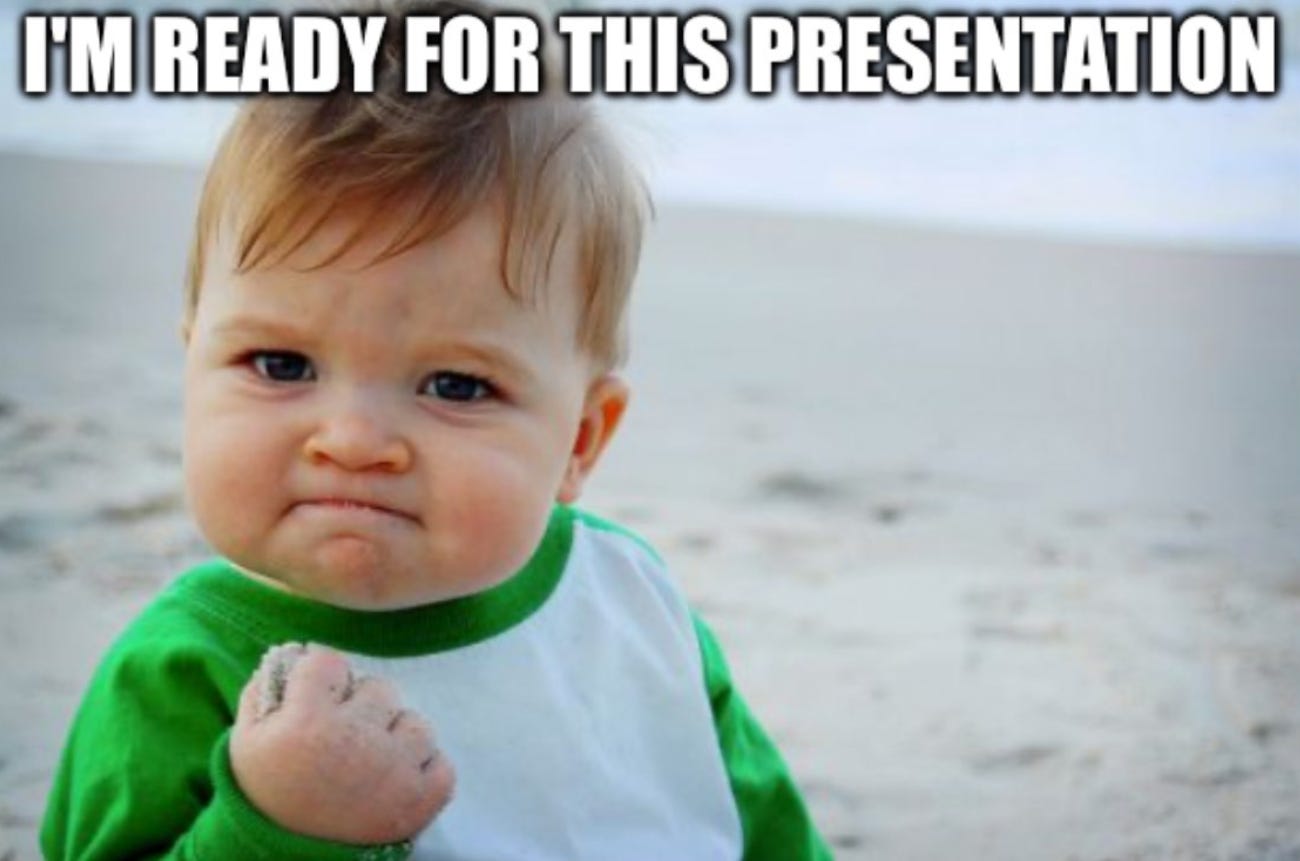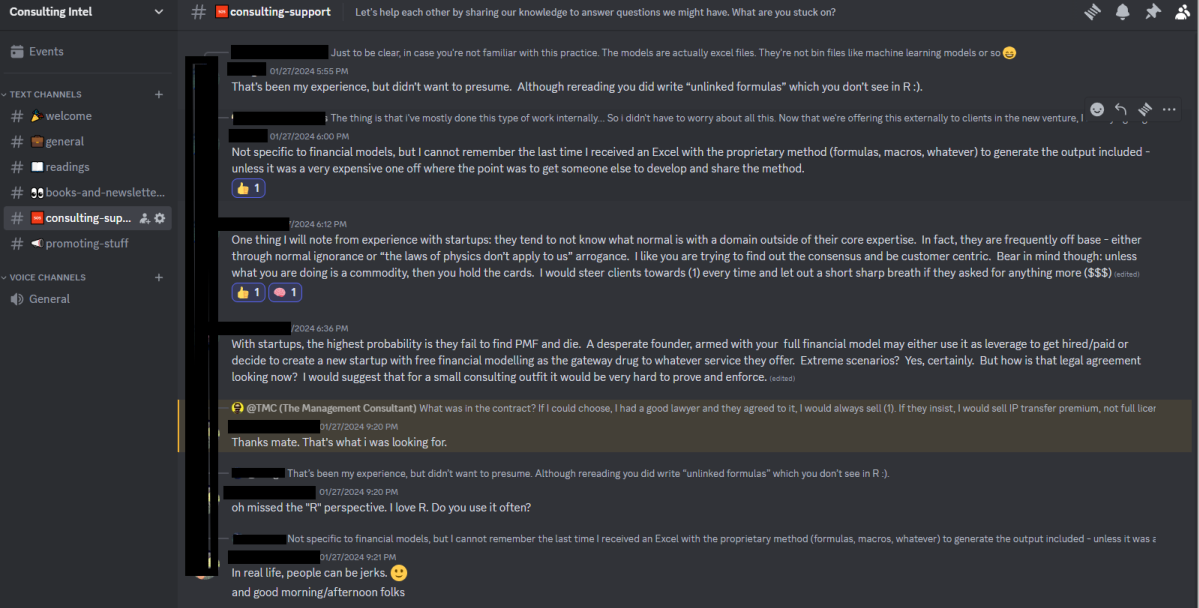The Dunning-Kruger effect in reverse: how expertise breeds insecurity
Focus on what you know, not what you don’t know: let your inner theater kid thrive.
Hello to the 1,777 subscribers who read Consulting Intel!
In the world of consulting, as in many other professional services fields, there is an interesting phenomenon commonly in play: the more you know, the more you realize how much you don’t know.
This realization can be a source of great anxiety and insecurity, especially for those who are just starting their careers.
I, for one, have a lot of experience there.
As a young consultant, I would spend hours preparing for client presentations, only to be plagued by doubts and uncertainties about what I didn’t know. Meanwhile, the partners on the project seemed to breeze into meetings with an air of unshakable confidence despite having spent far less time preparing.
Sometimes, I would brief them 30 minutes before the meeting, which was enough for them.
Once, I was in a cab with my engagement partner, let’s call him Ross, en route to the client’s office where we were due to give a presentation to the Head of Treasury at a big bank.
Ross asked me a couple of questions, “What are we talking about in this meeting?” he pulled the presentation on his iPhone, scrolled through the slides, asked me a couple of more questions, and was done with his prep within the first 3km of the taxi ride.
I had more knowledge than Ross about that specific presentation we would give the client, yet I could feel he was more confident than me as the meeting approached.
Partly, our roles differed: a partner can get away with talking some generic stuff, but I had to discuss details, numbers, and pointed solutions. If any questions had come from the client, l would be expected to answer.
However, that consideration is just scratching the surface of the confidence paradox.
The deeper you go into a subject, the more you become aware of the vast knowledge you have yet to acquire.
In psychology, a phenomenon known as the Dunning-Kruger effect is often discussed.
The basic idea is that people with low knowledge or skill levels in a particular area tend to overestimate their abilities.
While the Dunning-Kruger effect is often used to explain the overconfidence of novices, my first-hand experience with business leaders suggests that it can also work in reverse.
For experienced professionals, the awareness of their knowledge gaps can be a source of insecurity and anxiety, even when they are objectively well-prepared and capable of handling any questions or challenges that come their way.
What is the solution to this problem?
I touched upon a few related techniques in the newsletter issue below, but my favorite tactic is always to focus on what you know, not on what you don’t know.
Instead of dwelling on your uncertainties and insecurities, concentrate on the knowledge and skills you have acquired through hard work and dedication. Trust your abilities, and believe you can rise to the occasion when called upon.
Of course, this is easier said than done, but it does become more manageable if you prepare well and try not to leave anything to chance.
Good consultants usually let their inner theater kids thrive.
It takes time and practice to develop the confidence that more senior people possess naturally. Still, by shifting your focus away from your knowledge gaps and toward your strengths, you can cultivate a sense of self-assurance that will serve you well in any situation.
If you are preparing for a presentation, take some time to practice it.
Ask your mentor to help you with drafting the storyline.
Think through possible questions your audience could ask and formulate precise answers.
And at the moment when a query comes up which you are unprepared for, believe that you can rely on your mentor, your peers, and your improv skills to craft a satisfactory answer for the client.
The key to confidence is not to know everything but to be comfortable with what you know and to trust in your ability to learn and adapt as needed.
My engagement partner Ross had understood his role was not to know everything about the project.
He was okay with knowing just enough and trusting his experience, and his team (me!), to jump in if needed. He was assured about his strengths and mine, which allowed him not to be anxious about what he did not know or my potential mishaps.
Aim to overcome the insecurities that come with expertise and approach every challenge with the calm, self-assured demeanor of a true unf*ckable with professional.
✍ The Management Consultant
PS: If you like this newsletter, I have one huge favor to ask.
Share it around with friends, family and colleagues.
This is the most effective way to support me (…and to keep me motivated to continue writing 😁).
Thank you 👇👇👇
🎯 INTERESTING SH*T
A few things I found on the internet that you may like…
A paper on mechanism design for blockchains. I love reading semi-technical pieces around blockchain potential because it takes me back to the days of studying Computer Science, when I was young, smart and handsome. This article is written by Tim Roughgarden, a Computer Science professor at Columbia University.
Interesting! 55 tips for Working From Home. You probably know most of them, but some could be good experiments to take on (I like the “hot corners” idea) 👀
🚨 SPONSORSHIP
Consulting Intel is read by more than 1,700 consultants globally.
The readers include management consultants from McKinsey, BCG, Bain, Deloitte, EY, EY-Parthenon, KPMG, PwC, Accenture, Oliver Wyman, PA Consulting, and various boutique consultancies worldwide.
Many corporate employees and independent consultants are regular readers of Consulting Intel.
If you think your products or services could resonate with this audience, get in touch!
👀 JOIN THE DISCORD SERVER
If you like this newsletter, you will love our Discord Server.
In there, you will find a tight-knit community of more than 100 management consultants from all over the world discussing real-life challenges, giving each other support and recommending the good stuff to keep our knowledge top notch.







Great piece. Maybe we could write something together one day? My field of expertise is self aware leadership and I have a hunch that increasing self awareness opens up the nagging doubt of imposter syndrome.
I spoke to Adrian Ashton about it recently (you can find his book on Amazon) in my podcast and the episode will go live in a few weeks.
I know this way too well... Thanks for the little push of confidence for a final job application round next week!